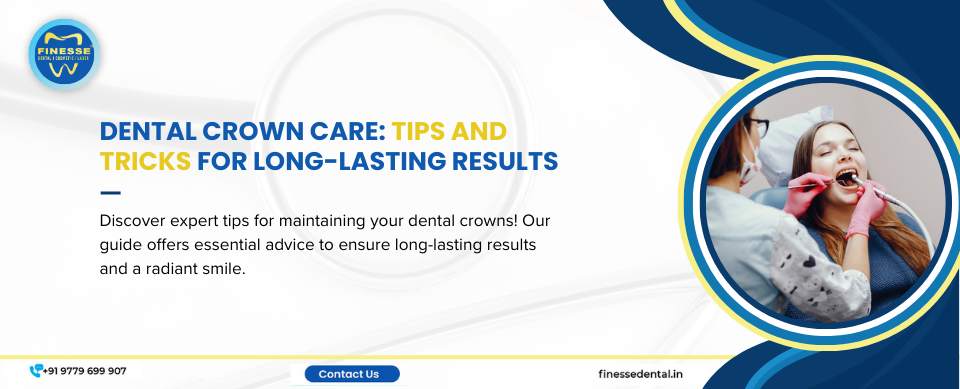- May 15, 2024
- Comment: 0
- Blog
Dental Crown Care: Tips and Tricks for Long-lasting Results
Dental crowns, also known as caps, are tooth-shaped restorations that cover and protect a damaged, decayed, or weakened tooth. While crowns offer a durable solution for restoring functionality and aesthetics, proper care is crucial to ensure their longevity. With the right habits and regular dental visits, your crown can last for many years, allowing you to maintain a healthy and confident smile.
Understanding Dental Crowns: Types and Lifespan
There are various types of dental crowns available, each with its own advantages and lifespan. Here’s a quick overview:
- Metal Crowns: Durable and long-lasting (up to 15 years or more), metal crowns are strong and can withstand significant wear and tear. However, their metallic appearance might not be aesthetically pleasing for everyone.
- Porcelain-Fused-to-Metal (PFM) Crowns: Offering a balance between aesthetics and durability (lasting 7 to 15 years), PFM crowns have a metal base covered with tooth-colored porcelain. They provide a more natural look than metal crowns.
- All-Porcelain Crowns: These crowns prioritize aesthetics (lasting 5 to 10 years) and are made entirely of porcelain, offering a natural translucence that blends seamlessly with surrounding teeth. However, they might be more susceptible to chipping or breaking compared to metal crowns.
- Zirconia Crowns: A newer option, zirconia crowns are strong, durable (lasting 10 to 15 years or more), and offer a natural appearance. They are a good choice for patients who require a strong and aesthetically pleasing crown.
The average lifespan of a dental crown can vary depending on the type of crown, the quality of the material used, the placement of the crown in the mouth, your oral hygiene habits, and your diet.
Caring for Your Dental Crown: Essential Tips
By incorporating these practices into your daily routine, you can significantly extend the lifespan of your dental crown and maintain optimal oral health:
- Brushing and Flossing: Maintain a consistent oral hygiene routine. Brush your teeth twice a day with a soft-bristled toothbrush and fluoride toothpaste, paying close attention to the area around the crown. Flossing daily helps remove plaque and debris from areas a toothbrush can’t reach.
- Mindful Chewing: Avoid using your crowned tooth for biting or chewing hard foods like nuts, candies, or ice. These can damage the crown or the underlying tooth.
- Nightguards: If you grind or clench your teeth at night (bruxism), consult your dentist about wearing a nightguard. Bruxism can exert excessive pressure on your crown and lead to cracks or fractures.
- Regular Dental Checkups: Schedule regular dental checkups and cleanings with your dentist, typically every six months. During these visits, your dentist can assess the condition of your crown, check for any signs of wear or damage, and address any potential issues early on.
Additional Maintenance Tips:
- Avoid Sticky Foods: Sticky candies or foods can adhere to the crown and be difficult to remove, potentially leading to plaque buildup.
- Non-abrasive Toothpaste: Opt for toothpaste that is gentle on your crown and doesn’t contain harsh abrasives that could scratch the surface.
- Use Proper Tools: Don’t use your teeth as tools for opening packages or tearing objects. This can put undue stress on your crown and potentially damage it.
Warning Signs of Potential Issues
Be mindful of these signs that might indicate a problem with your dental crown:
- Chipping or Cracking: If you experience a chip or crack in your crown, schedule a dental appointment immediately to prevent further damage.
- Sensitivity or Pain: Pain or sensitivity around the crowned tooth could indicate underlying problems like tooth decay or loose crown.
- Loose Crown: If your crown feels loose, don’t attempt to fix it yourself. Contact your dentist as soon as possible.
Maintaining a Healthy Smile with Dental Crowns
Dental crowns are a valuable investment in your oral health and smile. By following these tips and tricks for proper care, you can ensure your crown lasts for many years to come. Remember, a proactive approach to oral hygiene and regular dental visits are key to maintaining a healthy and confident smile.

